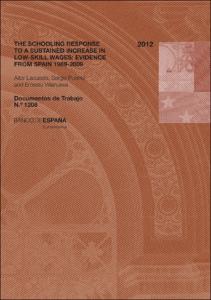The schooling response to a sustained increase in low-skill wages : evidence from Spain, 1989-2009
Authors
Issue Date
13-Feb-2012
Physical description
49 p. : tab., gráf.
Abstract
The response of human capital accumulation to changes in the anticipated returns to schooling determines the type of skills supplied to the labor market, the productivity of future cohorts, and the evolution of inequality. Unlike the US, the UK or Germany, Spain has experienced since 1995 a drop in the returns to medium and tertiary education and, with a lag, a drop in schooling attainment of recent cohorts, providing the opportunity to estimate the response of different forms of human capital acquisition to relative increases in low-skill wages. We measure the expected returns to schooling using skill-specifi c wages bargained in collective agreements at the province-industry level. We argue that those wages are easily observable by youths and relatively insensitive to shifts in the supply of workers. Our preferred estimates suggest that a 10% increase in the ratio of wages of unskilled workers to the wages of mid-skill workers increases the fraction of males completing at most compulsory schooling by between 2 and 5 percentage points. The response is driven by males from less educated parents and comes at the expense of students from the academic high school track rather than the vocational training track
La respuesta del capital humano ante cambios de la estructura salarial tiene implicaciones sobre la evolución de la productividad del trabajo. En España han caído tanto los rendimientos salariales de distintas formas de educación como el nivel educativo de las cohortes nacidas tras 1976. Este documento utiliza datos de la Encuesta de Población Activa entre 1992 y 2009 y del Registro de Convenios Colectivos para estimar la respuesta del capital humano ante cambios en la estructura salarial percibida por los jóvenes a los 17 años de edad. Los rendimientos salariales de la educación se miden utilizando los salarios negociados para cada nivel de cualifi cación en convenios de ámbito provincial y sectorial, ya que estos son fácilmente observables y, como se documenta, varían poco ante cambios en la oferta de trabajo de los jóvenes. Un aumento relativo de los salarios de los peones del 10% aumenta la proporción de varones con educación obligatoria entre 2 y 5 puntos porcentuales, a costa de la proporción de jóvenes que acaban el bachillerato. La respuesta se debe principalmente a los varones cuyas familias tienen un menor nivel educativo
La respuesta del capital humano ante cambios de la estructura salarial tiene implicaciones sobre la evolución de la productividad del trabajo. En España han caído tanto los rendimientos salariales de distintas formas de educación como el nivel educativo de las cohortes nacidas tras 1976. Este documento utiliza datos de la Encuesta de Población Activa entre 1992 y 2009 y del Registro de Convenios Colectivos para estimar la respuesta del capital humano ante cambios en la estructura salarial percibida por los jóvenes a los 17 años de edad. Los rendimientos salariales de la educación se miden utilizando los salarios negociados para cada nivel de cualifi cación en convenios de ámbito provincial y sectorial, ya que estos son fácilmente observables y, como se documenta, varían poco ante cambios en la oferta de trabajo de los jóvenes. Un aumento relativo de los salarios de los peones del 10% aumenta la proporción de varones con educación obligatoria entre 2 y 5 puntos porcentuales, a costa de la proporción de jóvenes que acaban el bachillerato. La respuesta se debe principalmente a los varones cuyas familias tienen un menor nivel educativo
Publish on
Documentos de Trabajo / Banco de España, 1208
Subjects
Collective bargaining; Human capital; Negociación colectiva; Capital humano; Negociación colectiva; Educación y empleo; Diferencias salariales por otras causas; Déficit y deuda públicos; España
Appears in Collections:












